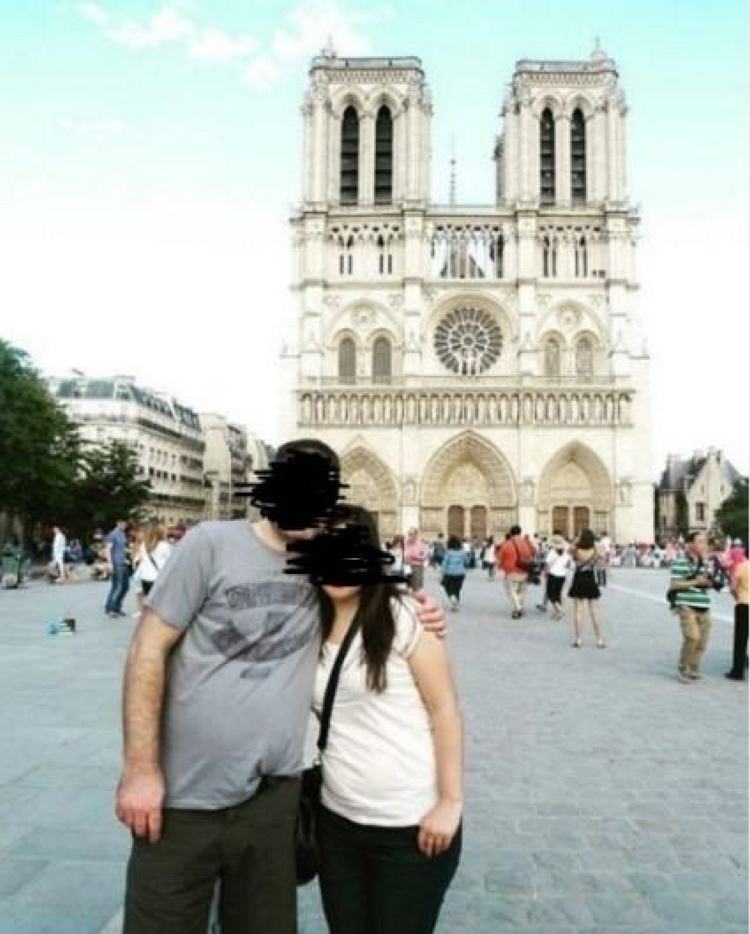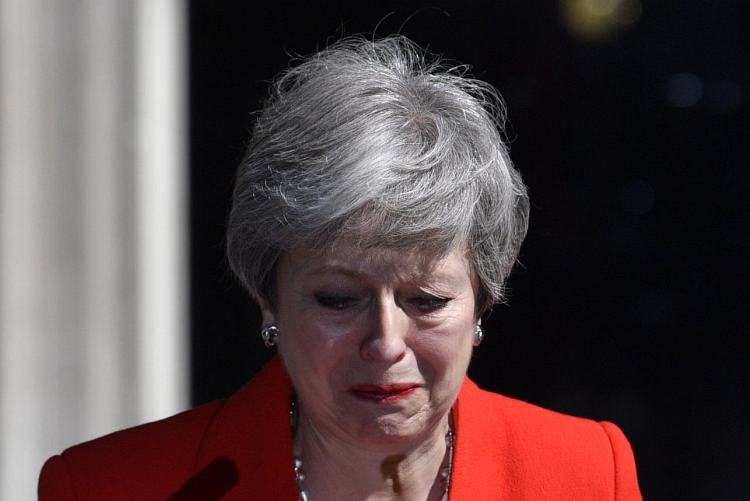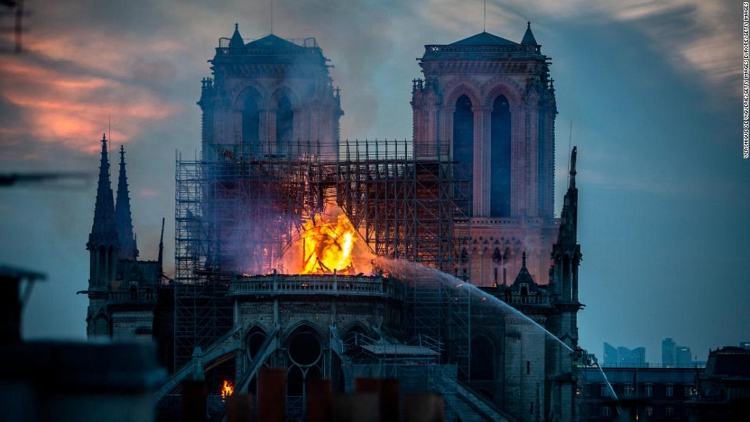Some People Care More About Buildings Than Humans - That's Life

Featured image: Cathédrale Notre-Dame de Paris being engulfed by an inferno in April 2019. (The Mirror)
Humans are a funny bunch. When it comes to mustering flickers of passion for some of the greatest tragedies facing humanity—climate breakdown, disease outbreak, world hunger, war, inequality—the majority of us are impotent.
Many will claim that we are an inherently good species and that our goodness is only eroded by the world we live in. But how can this be true? We choose to live blissfully in ignorance. We’re aware but indifferent to all kinds of known suffering. What indictments these are to a rational and intelligent species!
But in this article I want to throw a curveball: I want to claim that ignorance and indifference are inevitable parts of being human. Further, I want to excuse this behaviour. However, I will argue that such self-concernedness doesn’t spell the end of morality.
Notre-Dame
To the world’s dismay, a raging fire destroyed much of Notre-Dame, Paris’ stunning, gothic cathedral, in April 2019. In the aftermath, as emotional outpourings flooded every media stream with people lamenting the building’s destruction, I learned a few things about humankind.
‘Isn’t the Notre-Dame just a building?’ I asked myself. Wood, stone, and other materials pieced together to form an object. Why do we care?
We care because we value the art, history, and culture the building embodies. But ‘embodies’ is a misnomer because we externally place value upon it.
This value is reflected in our reaction to the its fiery destruction. Hundreds of millions of euros were pledged towards its restoration, with the majority of it coming from two of France’s wealthiest families. While the desire to rebuild such an awe-inspiring monument is a noble deed in itself, not everyone was pleased with the implication it held: these financial commitments show that people will part ways with cash—just not for people in dire need.

'How sad, the architectural and cultural heritage that we have all lost!' Thousands of holidaymakers were quick to express grief online. They emotionally connected themselves to an ornate and aesthetically pleasing building in virtue of standing next to it. (@gabrielaquiroz_mgq/Instagram)
Is prioritising the rebuilding of Notre-Dame a morally justifiable position over solving many of the problems in the world right now? I suspect not. If there is anything to be said of morality, it is that people ought to be more valuable than lifeless objects. I’m sure someone could build a moral case for saying the restoration will make people happier than investing in numerous philanthropic projects but I don’t think their moral analysis would stand (do you?).
Underpinning people’s resentment is a view that the rich don’t value people’s welfare as much as they value art, history, and culture. I don’t think their apathy is hypocritical, though: we all value things emotionally closer to us whilst not valuing things we’re physically and mentally disconnected from. For example, I spend more time complaining about wealth inequality in the UK and animal rights more than I do about wars in the Middle East and humanitarian crises. I have connections to these causes as they have either affected me personally or, because of experiences in my own life, I can orientate my sentiments towards them more freely.

People tend to be more outraged by dog-meat festivals than the slaughtering of billions of farm animals worldwide each year. But I understand why they feel like that: they are familiar with dogs. (@animahopeandwellness/Instagram)
This doesn’t mean my experiences have to be the same as people in groups I am standing in solidarity with (e.g. women). But it does mean that the empathy I project onto them has to be born from adversities I perceive to be similar to the ones I’ve faced (e.g. because I relate to similar social obstacles from being poor); else I won’t be be truly motivated by their causes.
Real solidarity, then, is always bounded by self-concernedness. Thus even if the superrich were pressed into rationalising why they hoard money but ignore those in need, they would not necessarily begin to change because they cannot possibly relate to their plights, which is a problem if we want their money.
Practical solutions to being different
I argue that we should pose the following moral question: how do we lead the world into valuing the ‘right’ kinds of tragedies? Collectively, do we force individuals into helping solve crises unrelated to them? Specific to Notre-Dame, do we tussle with neoliberalism, tax breaks, and various other common-persons’ antagonists? Perhaps. But if we coerce the rich into humanitarianism, we might cause their apathy to descend into anarchy when, instead, we could justly compel them into fruitful actions which they consent to. We need them to care.
This is all well and good but how do we achieve this utopian society, a society in which people who never cross paths connect their interests to one another’s?
Generally, I suggest that we work alongside people’s individual interests in the long run to avoid schizophrenic tugs of war between what they care about deep down—their irrational attitudes—and what they ought to do—their moral obligations.

A plastic straw being extracted from a sea turtle's nostril became one of the faces of the anti-plastic campaign (thanks to 'the Blue Planet effect'). Compelling people to care about ongoing environmental damage has been an unreasonably difficult task. Campaigning is only now reaching a high profile as, for example, paper bags and paper straws are distributed widely. Images like this, however, hit people with blows they can feel. As such, I recommend that environmentalism should come in a variety of hues if we want it to be effective. And it not to end with plastic: we ought to target people with palpable evidence that their familiar climates are breaking down, that their future families are significantly threatened by the risk of environmental catastrophes, and that poor people are disproportionately affected by natural disasters. (National Geographic)
We’re not homogeneously made organisms born into uniform cultures as replicas. We are products. So I’ve got my interests and you’ve got yours. I can’t make you authentically care about football, physics, or philosophy; and you can’t make me authentically care about steam trains, cattle markets, or the Royal Family. Values come us when we rationalise their importance to us—and, by extension, to the world—through existential self-discovery.
These differences manifest in our ideologies, too. Take the white, ‘working-class’ man. Why are his interests so frequently ignored by those who, righteously, fight injustices committed against, say, women, ethnic minorities, and trans people? Both sets of people are being marginalised. Why can’t we motivate ourselves to fight for everyone’s rights whereby priority is assigned according to adversity fought (or at least recognise intersectionality more)? Well, the pools of attitudes we dip into to pick our fights—the pools which we’ve filled with our own experiences—vary across individuals. Therefore, we are personally motivated by different things.

Theresa May, the outgoing Prime Minister at the time of the photograph, sheds tears as the end of her reign approaches. She didn't shed tears for many of the injustices she oversaw in government, including but not limited to the social consequences of austerity, the Grenfell tragedy, the reduction of police numbers on UK streets, and the 'hostile environment' she helped to surround migrants with. However, far from being the archetypal enemy of the poor and the weak, I genuinely think that she believes she was doing things for the right reasons. (European Pressphoto Agency B.V./Metro)
We are ideologically polarised today but there have always been spectra of fiercely opposing social and political ideas and wars fought on the backs of our values. And our interests will never be the same. We are complex, irrational creatures who possess heritable traits and dispositions. We are causally connected to the people, cultures, and norms that surround us. These are the sources of our unique sets of values, not an overarching, objective morality. What matters most to people is not some intrinsic measure of a moral life, like the optimisation of quality of life or the minimisation of death, but personal significance. Why else, for example, would the global reactive attitude to 9/11 be that much greater than the reaction to more-life-impairing and more-lethal events?
So do we surrender to moral relativism and stop fighting? No. Attempting to rationally convince each other of the right answers sits at the bedrock of progress. However, growth in finding the right answers will be stunted by a lack of personal motivation. Only when our personal values and reasoning power are united are we truly compelled into action, not endless, ineffective antagonism.
We know there are right answers; but we also know there are personal grievances, to which our motivations are irrationally embedded to. Recognising this will make us moral forces to be reckoned with. Let’s urge this practically achievable morality. We might be unshakeably selfish, inherent indulgers of own interests but, by embracing our diversity, we can still cooperate to promote global happiness.
Of course, we can’t just wish our differences away. Too many would be unwilling to compromise their current lifestyles: they are individuals burdened by their own woes who are under no obligation to care about yours. What we can do, though, through our policies, is slowly seep diversity into our communities, being careful not to make people feel threatened by torrents of change. We will all emerge as neighbours who mutually benefit from patience and toleration.
This reassurance that we don’t have to share our values will only be a precursor of the real victory: as fellow citizens who stand side by side, we will relate to one another more than ever, for we will have the space to flourish in ways meaningful to us; and people will finally understand the motivations behind our actions. In this disparate world we can still deploy reason and evidence; the only difference is that we will be fundamentally more connected. Mutual recognition of our differences, then—this strange common ground—will be the glue that, quite ironically, binds us.
Ending thoughts
Life is a bit odd: the more we think the scarcer straight answers become. I know I exist; I believe others exist, for we interact with the patterns, textures, sounds, and tastes we put in front of each other.
When we approach some of life’s biggest questions our realities are disorientated by inner turbulences that can’t locate sensible answers—around death, meaning, truth, and identity. This is true for morality too: we can’t converge on what our conduct should be; and we can’t compel others into valuing the same things as us. Expression of our values will verify this: we never truly reach a consensus on which problems in the world require action first. Disharmony pervades us.

Divergence by Gaya. Each of our abstractive reflections on the world expresses a unique worldview.
Personal pursuits take us deeper, more existential.
Yet, as individuals, we ceaselessly find ways to meaningfully comfort ourselves. We become free agents in an otherwise-nameless world, which passively subjugates us if we do not seek purpose. Surrendering ourselves to purpose like this is no easy task, though, for our deepest-held values can be too-easily juxtaposed against Earth’s atomic emptiness.
At thunder and tempest,
At the world's coldheartedness,
During times of heavy loss
And when you're sad
The greatest art on earth
Is to seem uncomplicatedly gay.
In Dostoevsky’s The Idiot a dying man named Ippolit, nihilistically drenched in a world of meaninglessness, laments the optimism held by a blissfully ignorant prince, our agent, for the futility it bears:
But who are these external agents to say we can’t hold ‘absurd’ values dear—values we believe in, no matter what they say, to be good for the world. They are real; justification is unwarranted. We can—we can console ourselves with private irrationalities, a sentiment which immediately reminds me of Oliver Sacks’ obsession with metals and minerals:
His obsession elicits in me a recognition of the fact we all mentally nourish ourselves with things that don’t make sense beyond our being; things that bring us comfort nonetheless. More, in the queer light of meaning, of illumination of the world from an agent’s perspective, by channelling our passions we transcend stagnation and grasp liberty. And so, with necessary insanity, this is how we must continue to coexist.

